#invasion of poland
Text

85 years ago today Hitler invaded Poland. He felt he could get away with it the way he got away with a half dozen or so annexations or occupations since 1935. Instead, the worst war in human history broke out. It could have been prevented if Western democracies had said „NEIN!” to Hitler much earlier in his lust for additional territory.
Just as there were people willing to appease Hitler in the 1930s, there are people trying to appease Vladimir Putin today.
History Makes Clear the Risks of Appeasing Putin
Appeasement of Hitler didn’t work, and appeasement of Putin threatens the safety not only of Europe but of the world beyond. The GOP appeasement caucus might want to think about what future generations are going to say about them; history has not looked kindly upon the western leaders who sold out Czechoslovakia and, in the name of peace, fueled a much broader war.
J.D. Vance, the Republican candidate for VP, is a notorious appeaser.
#world war ii#adolph hitler#invasion of poland#appeasement#invasion of ukraine#stand with ukraine#vladimir putin#gop appeasement caucus#j.d. vance#election 2024#II wojna światowa#россия#агрессивная война россии#владимир путин#путин хуйло#добей путина#диктатура#руки прочь от украины!#умиротворення#нацистська німеччина#вторгнення оркостану в україну#деокупація#слава україні!#героям слава!
41 notes
·
View notes
Text

Today Is The First Of SEPTEMBER!
32 notes
·
View notes
Text

Junkers Ju 87B Stuka from I./St.G 76, after the invasion of Poland, 1939. For more, see my Facebook group - Eagles Of The Reich
26 notes
·
View notes
Text
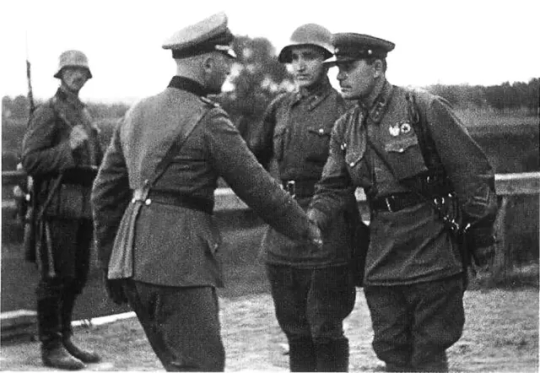
German and Soviet officers shake hands after the conclusion of the cooperative invasion of Poland, Oct 1939
31 notes
·
View notes
Text
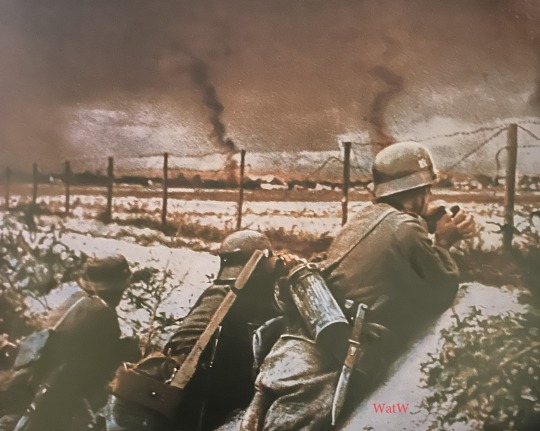
German troops watch the effects of artillery fire - Warsaw, Poland, 17th Sept 1939
#world war two#1940s#worldwar2photos#history#ww2#wwii#ww2 history#wwii era#world war 2#ww2history#wehrmacht#ww2colourphotos#Poland#Warsaw#sept 1939#1939#invasion of poland
90 notes
·
View notes
Text

ProleWiki lies about the Soviet invasion of Poland….
ProleWiki - the online Marxist-Leninist "proletarian encyclopaedia" - is a rich source of unintentional humour that's full of reality-denying Kremlin propaganda, unfiltered tankie insanity and shitloads of vacuous political necrophilia.
The above screenshot includes all that Prolewiki has to say about Poland's experience of the Second World War. Apparently, nothing else happened that was worthy of mention…. 😂
It's true that Germany invaded Poland on 1st September 1939, but the claim that the Polish government left the country on 16th September is a lie, and the reason given for the Soviet Union's invasion of Poland is also deliberately dishonest.
With regard to the first claim - Polish government officials had begun to leave Warsaw on 7th September to escape the city's imminent encirclement by the German forces, which was complete by 16th September. The government initially relocated to Nałęczów, then to Krzemieniec. They had to keep moving to avoid being captured by the advancing Germans, and followed retreating Polish forces who were forming a bridgehead in south-eastern Poland in the forlorn hope that France would fulfil its treaty obligations to Poland by attacking Germany from the west by 17th September.
Here, with their back to two friendly nations, Romania and Hungary, the Polish army intended to make a last ditch stand - and if overwhelmed, to cross the border into Romania and make their way to the west to continue the fight from there. The government relocated to Zaleszczyki near the Romanian border on 14th September. When the town was bombed by the Luftwaffe, they moved to nearby Kuty (the Polish GHQ was now also nearby in Kolomyja), while some of the various foreign ambassadors and their staff crossed the border into Romania.
The Polish government was still in Kuty when, in the early hours of 17th September 1939, two Red Army groups (consisting of 25 rifle divisions, 16 cavalry divisions and 12 tank brigades with a total of half a million men) stormed into Poland's sovereign territory in a simultaneous offensive that was launched along the entire length of Poland's border with the USSR, aiming to occupy the eastern half of the country.
As a result, the Polish government held a cabinet meeting at 4PM on 17th September, in full knowledge that Soviet forces were rapidly advancing towards them. It was concluded that they should leave for Romania, and from there go on to France. Most of Poland's highest government officials managed to cross the border on the night of 17th-18th September. Marshall Rydz-Śmigły and his GHQ staff crossed the border the next day.
The truth is that they were forced to leave Poland as a direct consequence of the Soviet invasion, to avoid being captured by the Soviet invaders.
The claim that the USSR "entered" Poland to "protect its borders" is also false. The truth is that the invasion had already been pre-arranged with the Nazis, during and after the signing of the Molotov–Ribbentrop Pact of 23rd August 1939, which had defined the "spheres of influence" agreed by Nazi Germany and the Soviet Union, ie the territories that each of the signatories could invade without having to worry about retaliation from the other.
Soviet mobilisation began on 6th September.
On 9th September, Soviet foreign minister Vyacheslav Molotov sent a telegram to his German counterpart Joachim von Ribbentrop, to inform him that Soviet military intervention "….would take place within the next few days".
On 10th September, the Soviet press was full of "in depth analysis" of the situation in Poland, stressing that German victory was imminent.
The Soviet ambassador left Poland on 11th September.
The next day the Soviet press launched a strident propaganda campaign of fake news about the treatment of the Belarusian and Ukrainian minorities in Poland (which was remarkably similar to the propaganda campaign of fake news the German press had launched about the treatment of the ethnic Germans living in Poland to justify the Nazi invasion), along with claims that the Polish army was scarcely fighting at all. And - of course - as the Polish state was disintegrating, it was imperative for the Red Army to prepare to rush to the aid of their Belarusian and Ukrainian "brothers" (this campaign also had more than a few things in common with the Kremlin’s campaign to justify Russia's 2022 invasion of Ukraine, in which it claimed to be defending "oppressed" ethnic Russians).
On 14th September Molotov explained to the Germans that although the Red Army was ready to invade Poland, in order to justify the invasion politically: "….it was of the greatest importance not to take action until the governmental centre of Poland, the city of Warsaw, had fallen". Molotov therefore asked to be informed as soon as possible when the Germans expected to capture Warsaw.
Ribbentrop sent Molotov a message on 15th September which stated that: "The destruction of the Polish Army is rapidly approaching its conclusion, as appears from the review of the military situation of September 14 which has already been communicated to you. We count on the occupation of Warsaw in the next few days"….
This was premature (Warsaw actually held out until September 27th), but inspired an immediate response from Molotov. According to the German Ambassador in Moscow, Molotov told him that: "….military intervention by the Soviet Union was imminent - perhaps even tomorrow or the day after. Stalin was at present in consultation with the military leaders and he would this very night, in the presence of Molotov, give me the day and hour of the Soviet advance".
The USSR then put its invasion plans into action without delay.
In the early hours of 17th September a telegram from the German ambassador to the German Foreign Office confirmed the news that the Nazis had been eagerly anticipating: "Stalin received me at 2 o'clock at night in the presence of Molotov and Voroshilov and declared that the Red Army would cross the Soviet border this morning at 6 o'clock along the whole line from Polozk to Kamenetz-Podolsk. In order to avoid incidents, Stalin urgently requested that we see to it that German planes as of today do not fly east of the Bialystok-Brest-Litovsk-Lemberg Line. Soviet planes would begin today to bomb the district east of Lemberg. I promised to do my best with regard to informing the German Air Force but asked in view of the little time left that Soviet planes not approach the above-mentioned line too closely today. The Soviet commission will arrive in Bialystok tomorrow or day after tomorrow at the latest. Stalin read me a note that is to be handed to the Polish Ambassador tonight, to be sent in copy to all the missions in the course of the day and then published. The note contains a justification for the Soviet action. The draft read to me contained three points unacceptable to us. In answer to my objections, Stalin with the utmost readiness so altered the text that the note now seems satisfactory for us".
Stalin kept his word to the Germans about when the Soviet invasion would begin - 6AM - and at the appointed time, Soviet troops invaded Poland. Fortunately for them, there weren't many troops defending Poland's eastern border. The Polish army's south-eastern bridgehead was also rapidly destroyed by the combined pressure of the German and Soviet armies, although nearly 100,000 soldiers did escape before Soviet forces prevented any further troops from crossing into Romania. Many more were captured and deported to the east, including 15,000 officers who were murdered by the NKVD a few months later in what became known as the Katyn Massacre (another subject that ProleWiki is - not surprisingly - in denial about)….
#prolewiki#history#historical revisionism#second world war#world war 2#soviet union#ussr#invasion of poland#poland#polska#propaganda#disinformation#tankie#tankie clownland#bad history take#bad history takes#1939
5 notes
·
View notes
Text
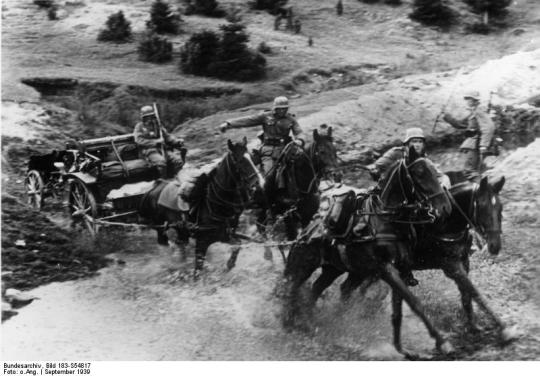
Traction hippomobile d'un canon d'infanterie 75 mm leIG 18 – Campagne de Pologne – Pologne – Septembre 1939
©Bundesarchiv - Bild 183-S54817
#WWII#campagne de pologne#polish campaign#invasion of poland#armée allemande#german army#heer#chevaux#horses#canon d'infanterie#infantry gun#75 mm leIG 18#7.5 cm leichtes Infanteriegeschütz 18#7.5 cm le.IG 18#pologne#poland#09/1939#1939
11 notes
·
View notes
Text
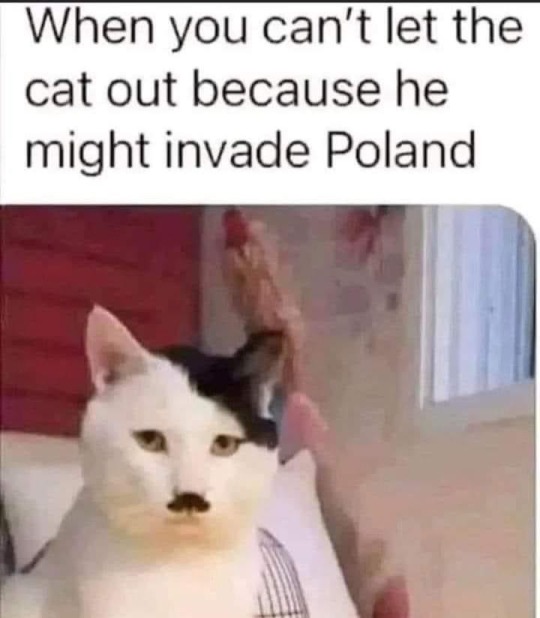
5 notes
·
View notes
Text
Until 1939, it was possible for all kinds of vaguely leftist, committed antifascists to support the Soviet Union without thinking too hard about it. But in that year Soviet foreign policy changed again – dramatically – and made it much more difficult to be an unthinking fellow traveler. In August, Stalin signed his nonaggression pact with Hitler. As noted in the introduction, the secret protocols of that pact divided Eastern Europe between the two dictators. Stalin got the Baltic States and eastern Poland, as well as northern Romania (Bessarabia and Bukovina). Hitler got western Poland and was given leave to exert his influence over Hungary, Romania, and Austria without Soviet objection. Following this pact, Hitler invaded Poland on September 1, 1939, and England and France declared war on Germany. Less than three weeks later, on September 17, 1939, Stalin invaded Poland too. The Wehrmacht and the Red Army met one another on their new border, shook hands, and agreed to exist in peace. Overnight, communist parties around the world were instructed to tone down their criticism of fascism. Hitler was not an ally, exactly, but neither was he to be an enemy. Instead, the comrades were to describe the war as one “between two groups of capitalist countries” who are “waging war for their own imperialist interests.” The popular fronts which had only “served to ease the position of slaves under a capitalist regime,” were to be abandoned altogether.
This tactical change was a great blow to communist solidarity. The German communist party was bitterly antifascist, and many of its members could not accept the idea of any accommodation with Hitler at all. The Polish communist party was torn in half between those who rejoiced at the Soviet invasion of eastern Poland – a change that created jobs and opportunities for many of them – and those horrified by the fact that their country had ceased to exist. Across the rest of Europe many communists were deeply confused by the new language they were supposed to adopt in response to these events. The Comintern itself dithered over its statement, drafting and redrafting its new “theses” so often that one Politburo member acidly complained that “By this time, Comr[rade] Stalin would have written a whole book!” In Moscow, great efforts were made to keep up morale. There is evidence that in February 1941 Ulbricht held a meeting of the German communist party in Moscow at the Hotel Lux, where he cheered them up by predicting, among other things, that the war would end with a wave of Leninist revolutions. The task of the German communists in Moscow, he told them, was to prepare for that possibility.
Yet the Soviet Union and Nazi Germany were, for twenty-two months, real allies. The USSR sold oil and grain to Germany, and Germany sold weapons to the USSR. The Soviet Union offered the Germans the use of a submarine base in Murmansk. The Hitler-Stalin pact even resulted in a prisoner exchange. In 1940, several hundred German communists were removed from the Gulag camps where they had been imprisoned and taken to the border. Margarete Buber-Neumann was among them. At the border, she wrote, these hardened German communists tried to ingratiate themselves with their old enemies: “The SS and Gestapo men thrust their hands into the air in the Hitler salute and began to sing 'Deutschland, Deutschland über Alles.' Hesitantly, our men followed suit, and there were very few who did not raise their arms and join in the singing. Among these latter was the Jew from Hungary.” Most of these loyal communists ended up in Nazi jails and camps. Buber-Neumann herself was sent directly from the border to a concentration camp, Ravensbrück, where she spent the rest of the war. She thus became a double victim, condemned to both the Soviet Gulag and a Nazi camp as well. These kinds of stories were quickly forgotten in Western Europe, where “the war” was the war against Germany. But they were remembered all too well in Eastern Europe.
— Iron Curtain: The Crushing of Eastern Europe 1944-1956 (Anne Applebaum)
#book quotes#anne applebaum#iron curtain: the crushing of eastern europe 1944-1956#history#military history#politics#communism#fascism#international relations#prison#imprisonment#gulags#ww2#molotov-ribbentrop pact#invasion of poland#germany#nazi germany#ussr#russia#moscow#hotel lux#walter ulbricht#margarete buber-neumann
3 notes
·
View notes
Text
The Slovak invasion of Poland
View On WordPress
0 notes
Text
Attack on Poland - The Exodus
Attack on Poland – The Exodus
17 – 30 September: Exodus of the Fortunate Few
The Polish Government, the military GHQ, civil servants and foreign diplomats started to evacuate Warsaw on 5 September. The aim was to reach the apparently still safe south-eastern Poland, bordered by the neutral Russia and friendly Hungary and Romania. Thousands of people were moving there, and on the evening of the 17th, the Polish Government…
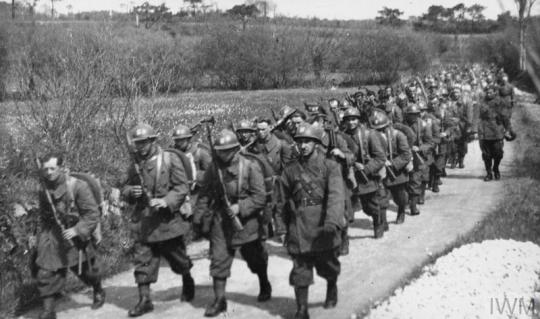
View On WordPress
#attack on Poland#Fall of Poland#German Invasion#German-Soviet Alliance#Invasion of Poland#Poland#Soviet Invasion
0 notes
Text

85 years ago today, the USSR, together with Hitler, attacked the Poland on September 17, 1939...
P.S. There is a lot of effort to erase from people's minds the fact that the Russian communists were actually allies of the Nazis and fought against the democratic Western countries as early as 1939...and as soon as the West saved the Russian communists from defeat in 1941/1941, the so-called "ally" Soviet Union was already thinking how to steal Western technology and start a new war against the West....
219 notes
·
View notes
Text

Soldiers of the 1st SS-Leibstandarte Adolf Hitler Division, resting in a ditch alongside a road on the way to Pabianice, during the invasion of Poland in 1939
#germany#ww2#waffen ss#leibstandarte#leibstandarte adolf hitler#1939#invasion of poland#third reich#nazi germany
12 notes
·
View notes
Text

A German lieutenant with his men during the Siege of Warsaw, September 1939
16 notes
·
View notes
Text
Meanwhile, Polish farmers continue to block the Ukrainian border. While Polish government, authorities and society as a whole does absolutely nothing about it, so i guess they're all fine with it.

Does Poland really want to share the border with russia, after all? Miss being a russian colony no matter what?
Poland has provided a lot of help to Ukraine, which is important and matters a lot, but now it looks like they really are trying to revert it as much as possible.
229 notes
·
View notes
Text

17/9/1939 - the Soviet Union invaded Poland from the east, to occupy the territory assigned to the USSR in the secret protocols of the Molotov-Ribbentrop Pact….
#molotov ribbentrop pact#ussr#soviet union#history#invasion of poland#second world war#world war 2#this day in history#on this day#on this date#1939
3 notes
·
View notes